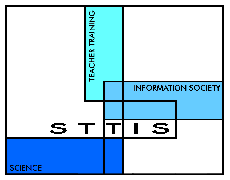Workshop 1
 Contents Contents
|
Section
C Transformations: content
| Activity
C1 |
Computer
modelling and subject knowledge |
|
|
Aims
-
To consider ways in which
the use of computer modelling
may be transformed by teachers.
-
To explore factors related
to the links between computer
modelling and subject knowledge that may influence the transformations.
-
To consider these issues
in the light of your own
teaching experience.
Background
The use of computers in
science teaching may make
it possible to do what is currently done better. It can also make
possible
things that are not currently done and actually change the nature of
what
is being learnt. How do teachers see the role of computer modelling and
simulation in relation to their existing practice? How does it relate
to
the subject knowledge of science? Is it another kind of practical work
or is it something different altogether? What kinds of things are being
taught about science and about computers when simulations are used? The
following stories address these questions.
[N.B. These stories are based
on research into the work of teachers implementing the use of computer
modelling. Though they are not based on particular individuals, they do
focus on issues that were identified in the research.]
What to do
1. It is best to do
this activity in a group
of two or three. Before you start discussion, however, work
individually
and read through each of the stories on page
2.
For each story, decide whether you are:
-
broadly sympathetic to the
position outlined in the
story (S)
-
broadly unsympathetic to
the position outlined in
the story (U)
-
neither (N)
Write the appropriate letter
next to each story.
2. Discuss
each story in turn within the
group. It may be useful to think about the following:
-
What is the key idea of
the story?
-
Are there points that the
teacher makes that we all
agree with?
-
Are there points that the
teacher makes that we all
disagree with? If so, is this because we disagree in principle or
because
we think the teacher has said something factually incorrect? Or because
they say something which may apply in their own situation but not in
yours?
-
What are the issues where
we do not reach a consensus?
What are the reasons for this?
3. After discussion,
work individually
again and look back over all of the stories. Pick out a few key
sentences,
which you agree with and think address the most important ideas for
you.
Underline them. Pick out a few sentences that you disagree with
strongly.
Underline them in a different colour or style. (Make a note of what the
colours/styles mean so that you can work it out later.) You will be
returning
to these sheets in a later session.
|

 Teaching with computer models
Teaching with computer models

